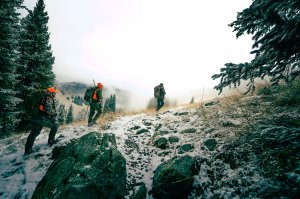California Department of Fish and Wildlife officials have confirmed the discovery of a new pack of gray wolves in the Sierra Valley, northeast of Sacramento. Wolf growth is rampant in the Golden State this year; At least 30 new puppies were born in California in 2024 alone, marking the largest single-year population increase in a century, officials say.
The “Diamond Pack” is California's ninth known pack, after migrating wolves from Oregon began repopulating the state in 2011. Before that, gray wolves had been extirpated from the state since the 1920s. The Diamond Pack currently consists of one male-female pair that officials expect will soon mate and produce offspring. The female dispersed from the Lassen pack and the male was previously unknown to researchers. The two have been traveling together for at least six months.
The other two packs discovered in 2024 include a yet-to-be-named pack of four wolves living in the northern reaches of the Lassen National Forest (not to be confused with the pre-existing Lassen Pack, whose territory lies further south in same national forest). and the Antelope Pack, another new male-female pair also active in the Sierra Nevada Valley, near the Diamond Pack's known territory.

Gray wolves in California are on both the federal and state endangered species lists. As Alex Hunnicutt, CDFW gray wolf coordinator, notes, wolves continue a steady march south from their more northern origins in the Pacific Northwest. California wolves have shown up within 10 miles of Reno in the past, and the male-female pair in the Diamond Pack are also known to have traveled near the Nevada state line.
While their natural repopulation is a cause for celebration for many stakeholders, there is also cause for concern among the state's ranchers and many hunters. Fourteen confirmed wolf depredations on livestock have occurred since August, including five in Plumas County, five in Siskiyou County, three in Lassen County and one in Tulare County. (Tulare County was also home to one “probable wolf” depredation and one “non-depredation,” or non-lethal encounter between wolves and livestock, during that period.)
“Clearly, we don't want to undermine the success of wolves in conservation,” said Kirk Wilbur, vice president of government affairs for the California Cattlemen's Association, told the San Francisco Chronicle. “But it is important that people know that as a population [of wolves] increases, we see a similar increase in the number of cattle, sheep and other animals killed by these wolves.”
Read Next: Colorado Wolf Pack captured and moved to “safe housing” after conflicts with ranchers
The discovery comes just weeks after CDFW announced a new partnership with the University of California at Rausser College of Natural Resources in Berkeley called the California Wolf Project. The group wants to better understand the “economic, environmental and social impacts of wolf recolonization in the state,” Hunnicutt said.
“It's exciting to see wolves back in California, but there are many questions about where they fit in a rapidly changing landscape with new challenges for agencies and ranchers,” said Arthur Middleton, UC Berkeley professor of wildlife management and co-leader of CAWP . . “We hope our growing team can provide new support to those interested in and impacted by the state's growing wolf population.”
Katie Hill
 Healthy Famz Healthy Family News essential tips for a healthy family. Explore practical advice to keep your family happy and healthy.
Healthy Famz Healthy Family News essential tips for a healthy family. Explore practical advice to keep your family happy and healthy.



